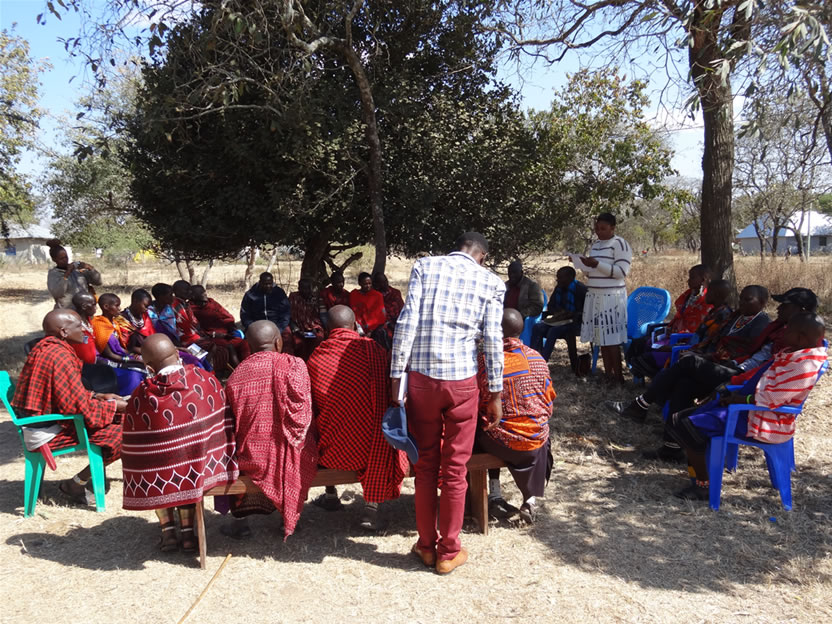
Coordination and Institutional Development (CID)
1. Operating Context
ALARI is currently involved in implementing projects in forty seven(47) villages. These projects include collective village land demarcation, surveying and titling; awareness building, organising women groups in small-scale income generation projects and supporting some primary health care initiatives. Although ALARI has put in place key policies, systems and procedures to provide guidance and management to its operations, there is still a need to strengthen them. It is therefore important that ALARI undertakes measures to improve its institutional and organisational effectiveness and manage its work for results.
All the planned programme activities are complementary since all the field activities, need the managerial back-up in planning, programme reviews, monitoring, lesson learning and reporting, and ALARI as an organisation needs such programmes for the justification of its existence.
2. ALARI Institutional Development
The support component of ALARI addresses institutional needs and requirements of ALARI. Being a relatively young organisation, ALARI needs to enhance its capacity through improving its structures, systems, policies and procedures to support programme activities relating to rights resource tenure security, joint village grazing clusters, water resource protection and development, livestock improvement and transformation of pastoralism, gender equity and women empowerment, climate change and cultural heritage and climate change resource centre.
In order to plan, monitor, coordinate and govern all programmes; institutional and organisational competencies are required.
3. Strategic Objectives and Framework
The strategic objectives of ALARI coordination and institutional development unit are:
• To enhance ALARI’ managerial capacity necessary for the planning, monitoring and evaluation of ALARI projects and programmees;
• To improve financial management;
• To diversify ALARI funding sources and look for resources to implement planned activities;
• To improve ALARI collection of information, analysis and reporting of all project activities;
• To provide ongoing support to field-workers and villagers in priority setting and designing of development initiatives;
• To coordinate research and documentation in order to inform policy and actors in pastoral development;
• To raise standards of living of pastoral communities in target areas through improvement of quality of development work;
• To reduce vulnerability, enhance resilience and adaptation to environmental vicissutitudes and climate change
4. Activities Items
ALARI co-ordination unit, plans to undertake the following activities on regular basis:
• coordination and support of ongoing land demarcation and titling in four districts in hoth Arusha and Manyara regions
• to recruit and retain qualified staff
• to develop clear procedures and controls;
• to provide on-going training to management;
• to secure adequate funding and equipment;
• organising workshops on how to resolve conflicts related to natural resource use
• bringing together ALARI founding members and board for regular meetings and consultation
• facilitate meetings of ALARI board of governors
• improving personnel policies
• improve financial policies
• collect cultural items and climate change information and store these in the centre repository
• fundraising/diversification of sources of funding
• reporting
• networking
5. Expected Outputs/results
• to have a core staff of managers to provide guidance and manage the programmes of ALARI effectively,
• board of governors that meets four times a year;
• to have in place necessary management systems, policies and procedures.
• decision-making structures, control and accountability;
• diversification of sources of funding.
• Networking with organisations involved in conflict resolution and food security in the region.
6. Monitoring and Evaluation
Already, monitoring and evaluation form an integral part of ALARI planning and implementation of activities. Ongoing evaluations are meant to assess performance and see whether programme objectives are being realised.
ALARI internal progromme assessment is carried out on regular basis and at various levels. Monthly meetings are designed to facilitate reporting on activities of the previous month and planning activities for the coming month. ALARI director programmes who is in-charge of fieldwork planning, monitoring and evaluation chairs these meetings. Planning, monitoring and evaluation meetings further bring ALARI staff together as a team.
At the policy level, ALARI has developed a set of checklists which ensure that its evaluations are participant focused and owned. This means that a wide range of stakeholders are involved at various stages of reviewing programme results; and that learning is at the heart of evaluations. Also, flexibility is built in planning programme activities; and rapid appraisal methods are used to assess the relevance of each component of the programme.


